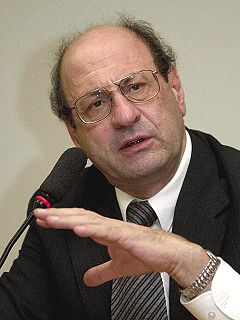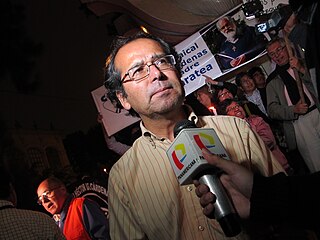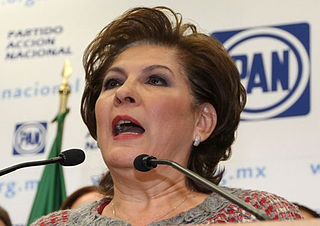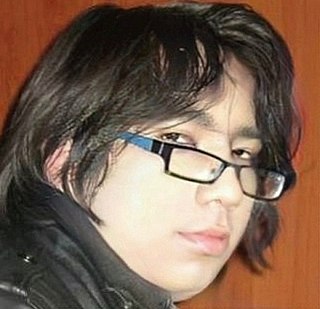Related Research Articles
Mireille Roccatti Velásquez, is a Mexican scholar and jurist who served as the first female president of the country's National Human Rights Commission.

Aminatou Ali Ahmed Haidar, sometimes known as Aminetou, Aminatu or Aminetu, is a Sahrawi human rights activist and an advocate of the independence of Western Sahara. She is often called the "Sahrawi Gandhi" or "Sahrawi Pasionaria" for her nonviolent protests. She is the president of the Collective of Sahrawi Human Rights Defenders (CODESA). She was imprisoned from 1987 to 1991 and from 2005 to 2006 on charges related to her independence advocacy. In 2009, she attracted international attention when she staged a hunger strike in Lanzarote Airport after being denied re-entry into Moroccan Western Sahara. Haidar has won several international human rights awards for her work, including the 2008 Robert F. Kennedy Human Rights Award, 2009 Civil Courage Prize and 2019 Right Livelihood Award.
Pilar Elena Mazzetti Soler is a Peruvian physician and health administrator who served as Minister of Health from July 2020 to February 2021, excluding her for nine days from office during the brief presidency of Manuel Merino. She previously held the position from February 2004 to July 2006, and was briefly Minister of the Interior from July 2006 to February 2007, being the first woman to reach said position in the Peruvian government.

Ricardo Luis Lorenzetti is an Argentine judge graduated from the National University of the Littoral, Argentina, with a long national and international career. He used to be Chief Justice of the Supreme Court of Argentina (2007-2018), proposed by President Néstor Kirchner and approved by the Senate, assuming his position on December 12, 2004, covering the vacancy caused by the resignation of Justice Adolfo Vázquez. On November 7, 2006, he was appointed Chief Justice, officiated as of January 1, 2007. Currently, he is one of the five Justices of the Supreme Court. He was President of the Commission for the preparation of the Parliamentary Act to reform, update and unify the Civil and Commercial Codes of the Argentine Nation, Presidential Decree 191/2011.
The UNESCO/Bilbao Prize for the Promotion of a Culture of Human Rights, created in 1978 as the UNESCO Prize for Human Rights Education to mark the 30th anniversary of the adoption of the Universal Declaration of Human Rights, serves to honour the efforts of organizations or individuals that have made an exemplary contribution to the advancement of knowledge on human rights and building a universal culture of human rights. It was renamed on 5 May 2008 under the terms of a memorandum of understanding with Mayor of Bilbao Iñaki Azkuna whereby the municipality of Bilbao agreed to fund the prize for a period of three years.

José "Pepe" Zalaquett Daher was a Chilean lawyer, renowned for his work in the defence of human rights during the de facto regime that governed Chile under General Augusto Pinochet from 1973 to 1990.
The Permanent Assembly for Human Rights is an Argentine non-governmental human rights organization; founded in 1975. According to its official website the organization is the product of a "call from people coming from distinct areas: the church, politics, Human Rights, sciences, culture, and labour Argentinians in response to the increasing violence and the collapse of the most elemental Human Rights in the country".

Augusta Deyanira La Torre Carrasco, also known as Comrade Norah, was a Peruvian terrorist, recognized as the number two in command of Shining Path. La Torre's influence on her husband, Shining Path founder Abimael Guzmán, is credited with establishing equality for women with regard to participation within the revolutionary organization, and during its militant actions.

Ronald Álex Gamarra Herrera is a Peruvian politician and lawyer specializing in human right issues. During 2008 to 2010, Gamarra was Executive Secretary of the Coordinadora Nacional de Derechos Humanos and one of the lawyers representing the civil parties -the families of the Barrios Altos and La Cantuta victims- in the proceedings against former president Alberto Fujimori. Between 2001 and 2004, he served as Ad Hoc Deputy Attorney General for corruption cases and human rights violations attributed to Fujimori and his principal adviser, Vladimiro Montesinos. Gamarra also participated in the process of extraditing the former president back to Peru from Chile. From 1988 to 2000, he directed the Justice Program at the Instituto de Defensa Legal. Gamarra Herrera writes a weekly column in the Lima daily La República and teaches at Universidad Mayor de San Marcos.

Julieta Montaño is a Bolivian attorney, human rights defender, woman's rights activist, feminist writer and a 2015 winner of the US State Department's International Women of Courage Award.

Isabel Miranda de Wallace is a Mexican educator and social activist. She has served as president of the civil association "Alto al Secuestro", and received the National Human Rights Award 2010 from the President of Mexico, Felipe Calderón. She was a candidate of the National Action Party in the 2012 Federal District of Mexico head of government election.

Since March 15, 2022, Chile bans discrimination based on "sex characteristics" under Law 21,430 on Guarantees and Integral Protection of the Rights of Children and Adolescents. Between December 2015 and August 2016, the Chilean Ministry of Health issued a regulatory suspension of non-necessary cosmetic medical interventions on intersex children. The guidelines were replaced by guidance permitting intersex medical interventions.
Consuelo Gloria Morales Elizondo is a Mexican human rights activist, founder and director of the organization Ciudadanos en Apoyo a los Derechos Humanos, A.C. (CADHAC), known in English as Citizens in Support of Human Rights.

Mònica Bernabé Fernández is a Spanish journalist known for her work as a correspondent in Afghanistan, where she lived for nearly eight years.

Liz Chicaje Churay is an indigenous Peruvian leader who has contributed significantly to the protection of rainforests and rivers in the Loreto area of northeastern Peru, safeguarding the rights of the Yagua people. Thanks to her efforts, the Yaguas National Park was established in 2018. In January 2019 in Lima, she was awarded the Franco-German prize for human rights by the French and German ambassadors.

María Soledad Pérez Tello de Rodríguez is a Peruvian lawyer, notary and politician. A prominent member of the Christian People's Party, she currently serves as its Secretary General since December 2017.

Raúl Alfonso Allain Vega is a Peruvian writer, poet, editor and sociologist. He is a contributor to media such as América Latina en Movimiento, Rebelión, Pressenza, Crónica Popular and La Onda digital.

The Movimiento Judío por los Derechos Humanos was a human rights organization in Argentina. It was founded by Marshall Meyer and Herman Schiller on August 19, 1983.
Iduvina Hernández is a Guatemalan journalist and internationally-known human rights activist. Her work has involved analyzing democracy and state security. Specifically, her research has focused on the violence which occurred during the Guatemalan Civil War and rebuilding the structures to support the country's democracy. In her childhood, her father was threatened by the National Civil Police and her husband was killed in 1984. She interrupted her education after his murder and moved to Mexico, living in exile there and working as a journalist until 1989. After her return to Guatemala, Hernández wrote articles focused on the war and counterinsurgency for Crónica magazine.
Coordinadora Nacional de Derechos Humanos is a coalition of Peruvian human rights groups founded in 1985. Members of the CNDDHH served on Peru's Truth and Reconciliation Commission. It has acted as the spokesperson for Peru's human rights movement since its founding. During Peru's internal conflict it communicated regularly with international human rights groups, foreign diplomats, and the United Nations.
References
- ↑ Onur Bakiner. Truth Commissions: Memory, Power, and Legitimacy. University of Pennsylvania Press, 2015. p. 258.
- ↑ "Una española, premiada por 30 años de defensa de los Derechos Humanos en Perú". 26 March 2008.
- ↑ "Fallece en Lima Pilar Coll, defensora de los derechos humanos". 15 September 2012. Archived from the original on 2 February 2019. Retrieved 30 December 2018.